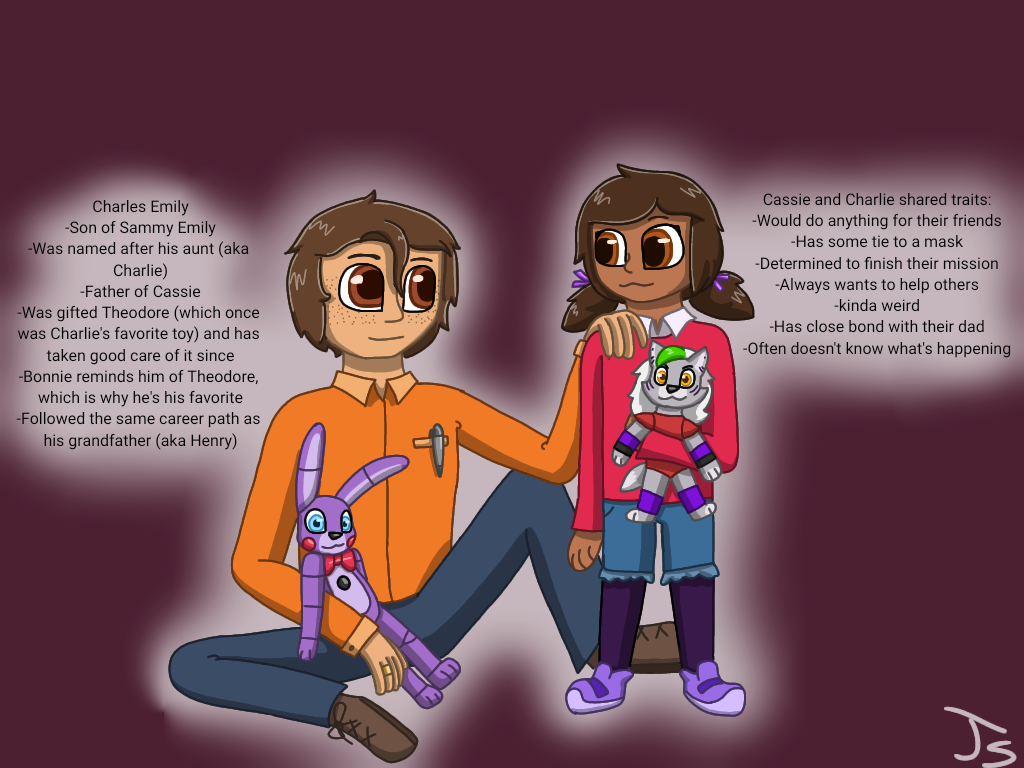Who Is The Father Of Cassie's Baby? Unraveling The Mystery Of Narrative Secrets
Have you ever found yourself caught up in a story, perhaps a book or a show, where one big question just keeps swirling in your mind? It’s a very common feeling, actually. Think about those moments when a character's past, or maybe even their family connections, aren't quite clear. This kind of setup can really grab your attention, making you wonder and guess about what's truly going on. It’s a powerful way stories keep us hooked, drawing us deeper into their world.
The question, "Who is the father of Cassie's baby?" is a perfect example of such a captivating puzzle. It’s a question that, in any narrative, immediately sparks curiosity and gets people talking. You see, when a story leaves a piece of information like this hanging, it invites us to become detectives, piecing together clues and forming our own ideas. It makes the experience much more personal, a bit like solving a puzzle right alongside the characters.
This kind of mystery isn't just about finding an answer; it's about the journey of discovery itself. It taps into our natural human desire to know, to understand, and to make sense of the world around us. And, you know, it's pretty fascinating how a simple question can hold so much weight, prompting countless conversations and theories among those who follow the story. It shows just how much we care about the characters and their lives, even if they're not real people.
- Tom Hanks Quote If Youre Funny
- Gary Oldman Knighted
- Michael Caine Miss Congeniality
- Anthony Hopkins Exorcist Movie
- Christopher Walken Googly Eyes Gif
Table of Contents
- The Allure of Unanswered Questions
- Why Paternity Mysteries Captivate Us
- The Role of Fan Theories and Community
- How Storytellers Build Suspense
- The Impact of a Reveal (or Lack Thereof)
- Frequently Asked Questions About Story Mysteries
The Allure of Unanswered Questions
There's something incredibly compelling about a secret in a story, isn't there? When a plot point, like the identity of a baby's father, is kept hidden, it creates a powerful pull. It makes us lean in, really paying attention to every detail, every hint dropped along the way. This kind of narrative device isn't new; storytellers have used it for ages to keep audiences on the edge of their seats. It works because, quite simply, we are built to solve problems and seek out information.
Think about it: when you encounter a question like "Who is the father of Cassie's baby?", your mind immediately starts working. You might go back through earlier parts of the story, looking for clues you might have missed. Perhaps you consider different characters who could be involved, weighing the possibilities. This active engagement is a big part of why these mysteries are so effective. It’s not just about passively watching or reading; it's about participating in the story's unfolding, which is pretty neat.
Moreover, these types of questions often touch on deep human themes: family, trust, betrayal, and identity. The mystery of a child's parentage can affect so many aspects of a character's life, and by extension, the entire narrative. It can change relationships, reveal hidden motives, or even alter the course of events in a big way. So, it's not just a trivial detail; it's often a central piece of the story's heart, which is why it grabs us so much.
- Samuel L Jackson In Pulp Fiction
- Al Pacino Oceans 13
- Mark Ruffalo Family
- Jeff Bridges The Dude
- Robert Downey Jr Haircut
Why Paternity Mysteries Captivate Us
Paternity mysteries, in particular, hold a special kind of fascination. There's a fundamental human interest in lineage and connection. Who we come from, who our parents are, can tell us a lot about who we are. When this information is unknown or kept secret in a story, it creates a sense of intrigue that’s very hard to shake off. It makes us wonder about the implications for the child, for the mother, and for anyone else involved. It’s a very personal sort of secret, you know?
These mysteries also often involve a sense of drama. There could be reasons for the secrecy – maybe protection, maybe shame, or perhaps a grander scheme at play. The potential for shocking revelations or emotional confrontations is always there, lurking beneath the surface. This anticipation of what might be revealed adds layers of excitement to the narrative. It’s like waiting for a big surprise, and that can be quite thrilling for us as an audience.
Furthermore, such questions can really make us feel for the characters. Imagine Cassie, holding her baby, with this big question hanging over them. We start to empathize with her situation, wondering about her struggles and her hopes for the future. This emotional connection makes the mystery even more impactful. It's not just a puzzle; it's a human story with real feelings at its core, which is, honestly, a big part of why we care so deeply.
The Role of Fan Theories and Community
When a story presents a big, unresolved question like "Who is the father of Cassie's baby?", it doesn't just keep individual readers or viewers guessing. It also sparks a huge amount of discussion and speculation among fans. People love to share their ideas, debate the possibilities, and try to predict what will happen next. This collective effort to solve the mystery becomes a big part of the fun, actually.
Online forums, social media groups, and even casual conversations with friends become places where these theories flourish. Someone might say, "I think it's this person because of that one line they said," while another might counter with, "No, it has to be someone else, remember that look they gave Cassie?" This back-and-forth is incredibly engaging. It builds a sense of community around the story, where everyone is trying to figure things out together. It's a bit like a shared detective game, you could say.
These fan theories can get incredibly detailed, too. People will scour every frame, every sentence, for tiny clues. They'll look for hidden meanings, subtle foreshadowing, and connections that might not be obvious at first glance. This deep level of engagement shows just how invested people become in these stories. It's a testament to the power of a good mystery, and how it can bring people together over a shared passion, which is, well, pretty cool.
How Storytellers Build Suspense
Crafting a compelling mystery like "Who is the father of Cassie's baby?" involves some clever techniques from storytellers. They don't just drop a question and leave it; they carefully weave hints and red herrings throughout the narrative. This keeps the audience guessing, sometimes leading them down one path only to reveal it was a distraction. It's a delicate balance, making sure there are enough clues to keep interest alive, but not so many that the answer becomes too obvious, which is quite a skill.
One common way they do this is by introducing several potential candidates. Each one might have a plausible reason to be the father, or perhaps a suspicious connection to Cassie. This creates multiple lines of inquiry for the audience to follow, making the puzzle feel richer and more complex. It's like having several suspects in a detective novel, each with their own motive and opportunity. This variety keeps the speculation fresh and lively.
Another technique is to delay the reveal. The longer the mystery remains unsolved, the more anticipation builds. This can be frustrating for some, but for many, it heightens the excitement. When the answer finally comes, if it does, it feels like a big payoff. This strategic pacing is key to maintaining suspense over a long period, whether it's across many episodes of a show or chapters in a book. It's a very deliberate choice, you know, to keep us waiting.
The Impact of a Reveal (or Lack Thereof)
The moment a big mystery, like the identity of Cassie's baby's father, is finally revealed can be a huge turning point in a story. It can bring a sense of closure, answer long-standing questions, and sometimes even completely change how we view previous events or characters. A well-executed reveal can be incredibly satisfying, making all that waiting and guessing feel worth it. It’s like the final piece of a very intricate puzzle just clicking into place.
However, sometimes, the answer isn't what people expect, or it might even be left ambiguous. A surprise reveal can shock an audience, for better or worse. If it feels earned and makes sense within the story, it can be brilliant. But if it feels out of left field or illogical, it can disappoint. This shows just how much the audience invests in their own theories and hopes, and how important it is for the story to respect that investment, more or less.
Then there are stories where the mystery is never fully resolved. The identity of Cassie's baby's father might remain a secret, or perhaps the story ends before the truth comes out. This can be frustrating for some, but for others, it adds a layer of realism or leaves room for continued speculation and discussion. It suggests that not all questions have neat answers, which is, in a way, true to life. It leaves a lingering thought, a little bit of wonder, long after the story is over.
Frequently Asked Questions About Story Mysteries
Why do storytellers keep paternity a secret?
Storytellers often keep paternity a secret to build suspense and keep the audience guessing. It creates a powerful hook, driving interest and encouraging deep engagement with the plot. This kind of mystery can also serve to reveal character traits, introduce new conflicts, or even set up major plot twists later on, which is quite effective.
How do fans usually react to these types of mysteries?
Fans typically react with a lot of speculation and discussion. They form theories, share clues they've found, and debate possibilities online and with friends. This collective problem-solving can build a strong sense of community around the story, making the experience more interactive and enjoyable for everyone involved, you know, fostering a shared journey.
What makes a paternity mystery compelling?
A paternity mystery becomes compelling when it has high stakes for the characters involved, meaning the answer truly matters to their lives and the story's direction. It also helps if there are multiple plausible suspects and a steady drip of clues, keeping the audience invested without revealing too much too soon. It’s about the journey of discovery, really, that keeps us hooked.
The curiosity about "Who is the father of Cassie's baby?" is a classic example of how a well-placed question can really make a story come alive. It shows how much we, as people, enjoy trying to figure things out, connecting with characters, and sharing our thoughts with others. These mysteries are a big part of what makes stories so captivating, drawing us into worlds that feel, in some respects, very real.
To learn more about how narrative structures keep audiences engaged, you might find this article on the elements of storytelling interesting. It helps to shed light on why these kinds of questions hold so much power over us. You can also learn more about storytelling techniques on our site, and link to this page here for more insights into character development.
- Johnny Depp Fear And Loathing In Las Vegas
- Jeff Bridges Haircut
- Morgan Freeman Life On Our Planet
- Jk Simmons Farmers Commercial
- Denzel Washington Pedro Pascal

Meet Cassie's Parents: A Journey Of Love And Parenthood

Cassie's dad {FNAF AU} by JetStream1985 on DeviantArt

Cassie’s Husband, Alex Fine, Shows Off His Impressive Physique In First